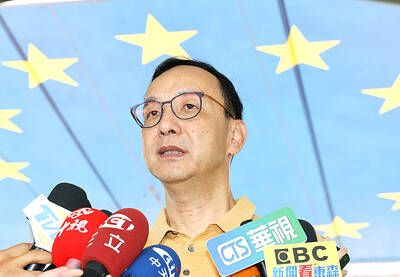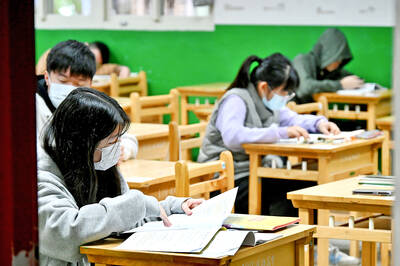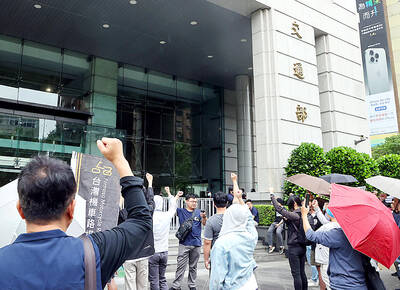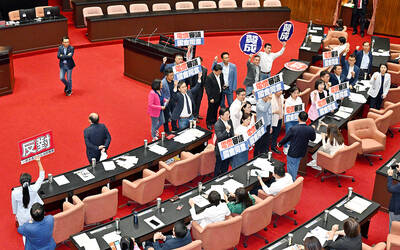The Environmental Protection Administration (EPA) yesterday celebrated its 21st birthday, with Minister Steven Shen (沈世宏) vowing to carry on the hard work of his predecessors. Shen also vowed to combat global challenges such as the energy crisis and global warming.
During the ceremony, former EPA ministers Winston Dang (陳重信), Eugene Chien (簡又新), Hau Lung-bin (郝龍斌) and Chang Chu-enn (張祖恩) were in attendance and commended the administration for its efforts in cleaning up the nation.
“In the past 21 years, the number of days Taiwan experienced bad air quality has dropped from 17 percent to 4 percent ... The number of rivers with pollution levels over the standard have dropped from 14 percent to 6.7 percent,” Shen said, adding that the nation also led the world in recycling, with daily waste per capita dropping from 1.1kg to 0.58kg.
However, massive construction projects as well as industrial development have elevated Taiwan’s carbon emissions to a level that puts it on par with the top carbon emitters in the world, Eugene Chien, the EPA’s first minister, said.
“From 1990 to 2006, while England and Germany’s emissions increased by 17 percent, and emissions in the US increased by 14 percent, Taiwan’s emissions increased by 113 percent,” he said.
“Taiwanese are now more and more aware of issues in environmental protection. However, it is also important to collaborate and make exchanges with other countries on environmental matters, as the effort to fight global warming should be taken to the international level,” he said.
Citing the Pacific Greenhouse Gases Measurement project, Dang said that “environmental diplomacy is not difficult and would be immensely helpful not only for Taiwan, but for the world.”
In the project, Taiwan offered “the last piece of the puzzle” for a group of European and Japanese scientists who wished to monitor the Earth’s greenhouse gas concentrations in the atmosphere.
Taiwan did so by installing observational equipment on China Airlines passenger flights, thus providing data over the Pacific Ocean, which was data that the joint European and Japanese project lacked.

GOOD DIPLOMACY: The KMT has maintained close contact with representative offices in Taiwan and had extended an invitation to Russia as well, the KMT said The Chinese Nationalist Party (KMT) would “appropriately handle” the fallout from an invitation it had extended to Russia’s representative to Taipei to attend its international banquet last month, KMT Chairman Eric Chu (朱立倫) said yesterday. US and EU representatives in Taiwan boycotted the event, and only later agreed to attend after the KMT rescinded its invitation to the Russian representative. The KMT has maintained long-term close contact with all representative offices and embassies in Taiwan, and had extended the invitation as a practice of good diplomacy, Chu said. “Some EU countries have expressed their opinions of Russia, and the KMT respects that,” he

CHANGES: After-school tutoring periods, extracurricular activities during vacations or after-school study periods must not be used to teach new material, the ministry said The Ministry of Education yesterday announced new rules that would ban giving tests to most elementary and junior-high school students during morning study and afternoon rest periods. The amendments to regulations governing public education at elementary schools and junior high schools are to be implemented on Aug. 1. The revised rules stipulate that schools are forbidden to use after-school tutoring periods, extracurricular activities during summer or winter vacation or after-school study periods to teach new course material. In addition, schools would be prohibited from giving tests or exams to students in grades one to eight during morning study and afternoon break periods, the

Advocates of the rights of motorcycle and scooter riders yesterday protested in front of the Ministry of Transportation and Communications in Taipei, making three demands. They were joined by 30 passenger vehicles, which surrounded the ministry to make three demands related to traffic regulations — that motorcycles and scooters above 250cc be allowed on highways, that all motorcycles and scooters be allowed on inside lanes, and that driver and rider training programs be reformed. The ministry said that it has no plans to allow motorcycles on national highways for the time being, and said that motorcycles would be allowed on the inner

AMENDMENT: Contact with certain individuals in China, Hong Kong and Macau must be reported, and failure to comply could result in a prison sentence, the proposal stated The Chinese Nationalist Party (KMT) and the Taiwan People’s Party (TPP) yesterday voted against a proposed bill by Democratic Progressive Party (DPP) lawmakers that would require elected officials to seek approval before visiting China. DPP Legislator Puma Shen’s (沈伯洋) proposed amendments to the Act Governing Relations Between the People of the Taiwan Area and the Mainland Area (臺灣地區與大陸地區人民關係條例), stipulate that contact with certain individuals in China, Hong Kong and Macau should be reported, while failure to comply would be punishable by prison sentences of up to three years, alongside a fine of NT$10 million (US$309,041). Fifty-six voted with the TPP in opposition